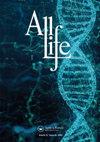Key genes of inflammation and Crohn’s disease severity identified via bioinformatics and clinical specimen analysis
IF 1.1
4区 综合性期刊
Q3 MULTIDISCIPLINARY SCIENCES
引用次数: 0
Abstract
Crohn’s disease (CD) is a nonspecific inflammatory disease of digestive tract with limited known biomarkers. We aimed to identify potential molecules involved in CD severity. Weighted gene co-expression network and differentially expressed gene analyses were used to explore hub genes associated with inflammation and involved in pathological processes of CD in the GSE83448 cohort. The expression and relationship of genes with clinical characteristics in normal and CD intestinal mucosa were validated in GSE208303 and our research cohorts. Five genes related to disease and inflammation were identified in the clinically significant modules that were differentially expressed in healthy controls and CD patients. Among them, solute carrier family 39 member 5 (SLC39A5) expression was reduced in CD tissues compared with that in normal tissues; low SLC39A5 expression was associated with CD-simplifying endoscopic score and stenosis. Furthermore, we broadened the bioinformatic threshold with qRT-PCR verification and western blot, and found that the expressions of cytochrome P450 family 2 subfamily S member 1 (CYP2S1), fatty acid 2-hydroxylase (FA2H), fatty acid binding protein 1 (FABP1), and Rho family GTPase 3 (RND3) were reduced in CD tissues. Therefore, SLC39A5, CYP2S1, FA2H, FABP1, and RND3 may be novel biomarkers for CD and associated with severity.通过生物信息学和临床标本分析确定炎症和克罗恩病严重程度的关键基因
克罗恩病(CD)是一种已知生物标志物有限的消化道非特异性炎症性疾病。我们的目标是确定与乳糜泻严重程度有关的潜在分子。通过加权基因共表达网络和差异表达基因分析,在GSE83448队列中探索与炎症相关并参与CD病理过程的枢纽基因。在GSE208303和我们的研究队列中验证了正常和CD肠粘膜中基因的表达及其与临床特征的关系。在健康对照组和乳糜泻患者的临床显著模块中发现了5个与疾病和炎症相关的基因的差异表达。其中,溶质载体家族39成员5 (SLC39A5)在CD组织中的表达较正常组织降低;SLC39A5低表达与cd简化内镜评分和狭窄相关。此外,我们通过qRT-PCR验证和western blot拓宽了生物信息学门槛,发现细胞色素P450家族2亚家族S成员1 (CYP2S1)、脂肪酸2-羟基化酶(FA2H)、脂肪酸结合蛋白1 (FABP1)和Rho家族GTPase 3 (RND3)在CD组织中的表达降低。因此,SLC39A5、CYP2S1、FA2H、FABP1和RND3可能是CD的新型生物标志物,并与CD的严重程度相关。
本文章由计算机程序翻译,如有差异,请以英文原文为准。
求助全文
约1分钟内获得全文
求助全文

 求助内容:
求助内容: 应助结果提醒方式:
应助结果提醒方式:


